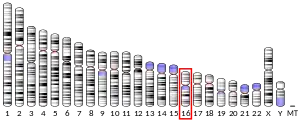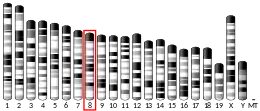PHKB
Phosphorylase b kinase regulatory subunit beta is an enzyme that in humans is encoded by the PHKB gene.[5]
| PHKB | |||||||||||||||||||||||||
|---|---|---|---|---|---|---|---|---|---|---|---|---|---|---|---|---|---|---|---|---|---|---|---|---|---|
| Identifiers | |||||||||||||||||||||||||
| Aliases | PHKB, phosphorylase kinase regulatory subunit beta | ||||||||||||||||||||||||
| External IDs | OMIM: 172490 MGI: 97578 HomoloGene: 247 GeneCards: PHKB | ||||||||||||||||||||||||
| |||||||||||||||||||||||||
| |||||||||||||||||||||||||
| |||||||||||||||||||||||||
| Orthologs | |||||||||||||||||||||||||
| Species | Human | Mouse | |||||||||||||||||||||||
| Entrez | |||||||||||||||||||||||||
| Ensembl | |||||||||||||||||||||||||
| UniProt | |||||||||||||||||||||||||
| RefSeq (mRNA) | |||||||||||||||||||||||||
| RefSeq (protein) | |||||||||||||||||||||||||
| Location (UCSC) | Chr 16: 47.46 – 47.7 Mb | Chr 8: 85.84 – 86.06 Mb | |||||||||||||||||||||||
| PubMed search | [3] | [4] | |||||||||||||||||||||||
| Wikidata | |||||||||||||||||||||||||
| |||||||||||||||||||||||||
References
- GRCh38: Ensembl release 89: ENSG00000102893 - Ensembl, May 2017
- GRCm38: Ensembl release 89: ENSMUSG00000036879 - Ensembl, May 2017
- "Human PubMed Reference:". National Center for Biotechnology Information, U.S. National Library of Medicine.
- "Mouse PubMed Reference:". National Center for Biotechnology Information, U.S. National Library of Medicine.
- "Entrez Gene: PHKB phosphorylase kinase, beta".
Further reading
- Brushia RJ, Walsh DA (1999). "Phosphorylase kinase: the complexity of its regulation is reflected in the complexity of its structure". Front. Biosci. 4 (1–3): D618–41. doi:10.2741/Brushia. PMID 10487978.
- Daube H, Billich A, Mann K, Schramm HJ (1991). "Cleavage of phosphorylase kinase and calcium-free calmodulin by HIV-1 protease". Biochem. Biophys. Res. Commun. 178 (3): 892–8. doi:10.1016/0006-291X(91)90975-D. PMID 1872871.
- Francke U, Darras BT, Zander NF, Kilimann MW (1989). "Assignment of human genes for phosphorylase kinase subunits alpha (PHKA) to Xq12-q13 and beta (PHKB) to 16q12-q13". Am. J. Hum. Genet. 45 (2): 276–82. PMC 1683359. PMID 2757032.
- Wüllrich-Schmoll A, Kilimann MW (1996). "Structure of the human gene encoding the phosphorylase kinase beta subunit (PHKB)". Eur. J. Biochem. 238 (2): 374–80. doi:10.1111/j.1432-1033.1996.0374z.x. PMID 8681948.
- Burwinkel B, Maichele AJ, Aagenaes O, et al. (1997). "Autosomal glycogenosis of liver and muscle due to phosphorylase kinase deficiency is caused by mutations in the phosphorylase kinase beta subunit (PHKB)". Hum. Mol. Genet. 6 (7): 1109–15. doi:10.1093/hmg/6.7.1109. PMID 9215682.
- van den Berg IE, van Beurden EA, de Klerk JB, et al. (1997). "Autosomal recessive phosphorylase kinase deficiency in liver, caused by mutations in the gene encoding the beta subunit (PHKB)". Am. J. Hum. Genet. 61 (3): 539–46. doi:10.1086/515502. PMC 1715950. PMID 9326319.
- Burwinkel B, Moses SW, Kilimann MW (1998). "Phosphorylase-kinase-deficient liver glycogenosis with an unusual biochemical phenotype in blood cells associated with a missense mutation in the beta subunit gene (PHKB)". Hum. Genet. 101 (2): 170–4. doi:10.1007/s004390050608. PMID 9402963. S2CID 27661807.
- Burwinkel B, Kilimann MW (1998). "Unequal homologous recombination between LINE-1 elements as a mutational mechanism in human genetic disease". J. Mol. Biol. 277 (3): 513–7. doi:10.1006/jmbi.1998.1641. PMID 9533876.
- Strausberg RL, Feingold EA, Grouse LH, et al. (2003). "Generation and initial analysis of more than 15,000 full-length human and mouse cDNA sequences". Proc. Natl. Acad. Sci. U.S.A. 99 (26): 16899–903. doi:10.1073/pnas.242603899. PMC 139241. PMID 12477932.
- Burwinkel B, Hu B, Schroers A, et al. (2004). "Muscle glycogenosis with low phosphorylase kinase activity: mutations in PHKA1, PHKG1 or six other candidate genes explain only a minority of cases". Eur. J. Hum. Genet. 11 (7): 516–26. doi:10.1038/sj.ejhg.5200996. PMID 12825073.
- Pallen MJ (2004). "Glucoamylase-like domains in the alpha- and beta-subunits of phosphorylase kinase". Protein Sci. 12 (8): 1804–7. doi:10.1110/ps.0371103. PMC 2323967. PMID 12876330.
- Gerhard DS, Wagner L, Feingold EA, et al. (2004). "The status, quality, and expansion of the NIH full-length cDNA project: the Mammalian Gene Collection (MGC)". Genome Res. 14 (10B): 2121–7. doi:10.1101/gr.2596504. PMC 528928. PMID 15489334.
- Rual JF, Venkatesan K, Hao T, et al. (2005). "Towards a proteome-scale map of the human protein-protein interaction network". Nature. 437 (7062): 1173–8. doi:10.1038/nature04209. PMID 16189514. S2CID 4427026.
External links
This article is issued from Wikipedia. The text is licensed under Creative Commons - Attribution - Sharealike. Additional terms may apply for the media files.




